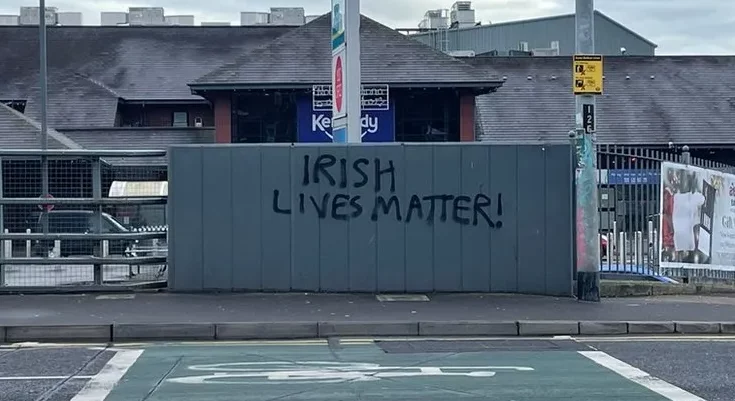Everyone is aware by now that Ireland has an “immigration issue”, with a portion of Dublin going ablaze after an Algerian-born — though naturalised Irish citizen for two decades — man went on a stabbing rampage, seriously injuring a woman and children. In West Belfast, graffiti reading “Irish Lives Matter” was daubed on a wall alongside signs railing against the “rehousing of illegal immigrants”. Clearly, what is being implied is the notion that Ireland is ruled by a detached, oikophobic, liberal regime that cares more about the interests of foreigners their own kin.
The problematisation of immigration and diversity in Ireland is symptomatic of the fact that Irish nationhood, and the idea of Irish peoplehood, is going through an identity crisis.
Irish nationalism is a broad phenomenon that contains many currents. Its inception was in the late 18th century with the United Irishmen, who were inspired by the universalist Enlightenment principles of the American and French revolutions. Their understanding of the Irish nation was not strictly ethnic, and certainly not sectarian, instead calling on the Irish to “forget all former feuds” and forge an independent republic based on civic liberty.
Since the mid-19th century, however, the dominant conception of Irish nationhood has been that of a romantic cultural nationalism. “Being Irish” has since denoted a strictly ethnic people, united by “concrete” and “natural” bonds to an ancient Celtic heritage. This identity was marked by Catholic religion and culture, and the Gaelic language as its primordial badge, with Eiré as their sacred heimat.
In the past few decades, Irish society has transformed dramatically, or to use Yeats’s blunt phrase: “Romantic Ireland’s dead and gone”. For one, it is now socially far more secular and liberal with the fading of the Catholic church’s domination of civil life. And secondly, its integration into neoliberal framework has meant years of mass immigration, which has significantly altered the demography of Ireland.
In an Ireland with a foreign-born population of 15%, and a small but growing non-white population, the question of Irishness thus becomes more acute. Indeed, the face of an Irishman is going to be more varied than before. “Black Irish” isn’t going to denote a strain of “white Irish” people with dark hair, apparently descended from Spanish Armada sailors, but of born and bred Irishmen and women who happen to be of African descent.
A romantic ethnonationalism that felt emancipatory against British colonialism, under new conditions, can easily mutate into racism against perceived “others”. Tommy Robinson, an Englishman no less, earlier this year made a documentary in collaboration with Irish anti-immigration activists called Plantation 2, comparing the 16th-century settler-colonisation of Ireland by Protestant British settlers to today. The trapdoor of such a discourse is that it condemns non-white Irish as permanent “others”: even if they have an Irish accent or speak Gaelic impeccably, they’ll never truly be “of” the nation because their religion or “race” makes them permanently alien to the (white) Irish/Celtic body politic.
Ireland isn’t unique in undergoing this national identity crisis. Plenty of European countries are having to go through a similar process of national redefinition. Germany, which was the birthplace of romantic ethnonationalism, has reexamined its entrenched ethnic conception of nationhood to better integrate its own minority population, especially its German-Turkish one, into the German nation.
There’s no inherent reason why Irishness isn’t strong enough to adopt immigrants and their descendants into Irish peoplehood. But if there isn’t mutual integration to make a civic whole, the perils of ghettoisation and separatism emerge — to the detriment of both immigrants and native-born populations. The country should therefore strive to emulate Wolfe Tone’s vision: “to unite the whole people of Ireland and to abolish the memory of all past dissentions”.











Join the discussion
Join like minded readers that support our journalism by becoming a paid subscriber
To join the discussion in the comments, become a paid subscriber.
Join like minded readers that support our journalism, read unlimited articles and enjoy other subscriber-only benefits.
Subscribe